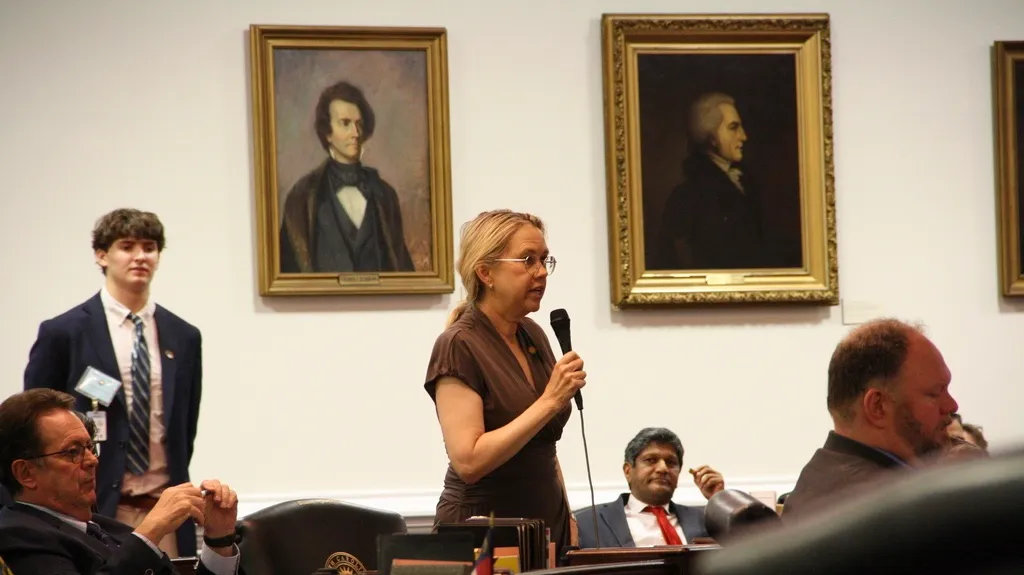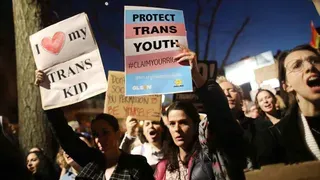December 21, 2007
LGBT youth describe harassment, bullying
Michael Wood READ TIME: 6 MIN.
About 35 high schoolers from Brockton, East Bridgewater, Fall River and Weymouth met with members of the Massachusetts Commission on GLBT Youth Dec. 17 at Brockton High School to give them a glimpse of life inside the region's public schools. The bottom line? They said that in many classrooms homophobic bullies seem to be running the show. They told commissioners that their fellow students frequently make anti-gay comments in the classroom and that their teachers often seem powerless to stop them. One Brockton sophomore said that for the past two years students have targeted him in class, calling him a fruitcake and a fag, and in many cases teachers declined to intervene.
"They're always saying their opinions, how gays are going to hell, and the teacher is just sitting there. ... I felt very alone and by myself," said the Brockton sophomore. (Bay Windows was permitted to cover the meeting, which was closed to the public, under the condition that the young people attending the event would not be identified by name, to preserve their confidentiality.)
A student from Durfee High School in Fall River said that last year he participated in the GLSEN Day of Silence event, where students pledged to remain silent during the school day to highlight the silencing of LGBT youth. Students in his English class teased him relentlessly to goad him into breaking his silence.
"They taunted and teased me to the point where tears were coming out of my eyes," said the student.
Eventually his teacher decided to have the class debate the Day of Silence and gay rights, but his fellow students used the opportunity to declare their anti-gay beliefs, making the student feel even more isolated.
In some cases students said teachers were actually afraid of discussing LGBT issues in the classroom, for fear that any discussion would prompt some of the students to let loose a torrent of anti-gay slurs and comments. One member of Brockton High's gay-straight alliance (GSA) said that a health teacher extended an invitation to her and another GSA member to come into one of her classes to talk about LGBT issues. Yet before the GSA members had a chance to address the class the health teacher rescinded the invitation.
"Then she changed her mind because she was afraid about how rowdy the class would be in response. That was pretty disappointing," said the GSA member.
Not all teachers described by the students were poor at handling discussion of LGBT issues in the classroom. Another Brockton student said her health teacher brought up the subject during class and led a respectful discussion.
"There were people who were making jokes, but a lot of us got into the discussion seriously," said the student.
The commission held the forum with the students as part of a series of regional meetings across the state to assess the issues facing LGBT youth, following meetings in Boston, Hyannis and Worcester held earlier this year. After the student forum at Brockton High, commissioners held an open meeting at the Brockton Holiday Inn to conduct formal commission business.
During the student forum, students from Brockton High said that while there are few out transgender students at the school, in at least one instance the administration, and particularly principal Susan Szachowicz, took steps to accommodate a trans student. One student said her ex-boyfriend was a female-to-male transman, and when he graduated last year Szachowicz allowed him to wear black robes along with the rest of the male graduates (females wore red robes) and to use his male name on his diploma. But she said there was a desperate need to educate the student body. Before her ex-boyfriend graduated she said students used to approach her and friends of the trans student and ask them, "Who is this freak?"
Commissioners also asked students about the issues they faced as LGBT students outside of school. The Brockton sophomore quoted above told the commissioners that his family refused to accept his homosexuality after he came out, and their reaction turned hostile after he started dating boys. He left home recently, and a lesbian couple agreed to take him in and welcome him into their family. He said if they had not offered him a home he would likely be living on the street.
"It's really nice to finally be in an accepting environment," said the student.
A few high school GSA advisors also attended the student forum, and they told commissioners that the state Department of Education (DOE) has failed to let them know about funding opportunities for their GSAs. When Jason Smith, chair of the commission, told attendees that one of the commission's priorities is to make sure that money allocated to DOE makes it out to the schools, one GSA advisor said in surprise, "I wasn't aware that we had access to any money at all."
Smith explained that there are "mini-grants" of around $1000 available to GSAs from DOE but that this year the department waited until the last minute to publicize them.
"DOE didn't tell anyone the money was there until two or three days before the deadline," said Smith.
Details of the grants posted on the DOE website suggest that the lack of publicity meant that many GSAs simply did not apply for funding. In the current fiscal year only 23 schools applied for the grants, and all of them received them. By contrast in the previous year 50 schools applied for the grants and all but one received them. Later on in the evening, during the commission business meeting at the Holiday Inn, Lisa Perry-Wood, chair of the commission's high school committee, said that part of the reason for DOE's failure to notify schools may be that Gov. Deval Patrick's administration has not yet appointed a permanent DOE commissioner, and the lack of leadership at the top has meant that some priorities have fallen by the wayside.
J.C. Considine, a spokesperson for DOE, disputed the claim that the department announced the GSA grants at the last minute.
"The request for proposal, the RFP, was posted the Friday before Labor Day, and it was open for almost a good two months. It closed Oct. 26," said Considine.
When asked how DOE publicized the grant to GSA advisors Considine e-mailed a statement to Bay Windows saying that the grant was announced on the DOE website at the end of August as part of the list of all available competitive grants offered by DOE for the current fiscal year. He said DOE also notified the commission, but he did not say when the department did so. DOE made no direct outreach to GSA advisors.
Acknowledging that there were fewer applications for the grant than expected (DOE budgeted $125,000 for the grants but distributed less than $25,000 to schools), Considine said DOE will re-open the grant application process next year.
"So if you do the math there's a lot of money still available, which means the department is going to release the RFP in January, and when we do that we're going to release it with an open submission date," said Considine.
During the business meeting the commission also discussed plans to lobby for increased Safe Schools funding in Fiscal Year 2009 (FY09). Eleni Carr, chair of the commission's government relations committee, said that her committee drafted a detailed funding request for Patrick describing specific LGBT youth programming initiatives and their expected cost, and the committee hopes to see a significant increase in LGBT youth funding for the coming year.
Following the meeting Carr told Bay Windows that she could not divulge the details of their funding request until after Patrick releases his budget proposal early next year, for fear of tipping off opponents of LGBT youth funding. But she said the request goes beyond the scope of state LGBT programming of previous years, focusing not only on the familiar topics of schools and suicide prevention but also on issues like homelessness, dating violence, sexual health and substance abuse. She said the request exceeds the state's $1.6 million high watermark for LGBT youth program funding in FY02.
"It's ambitious and it's more money than we have ever received," said Carr.
During the meeting the commissioners also voted to reappoint Smith as chair of the commission for 2008, which launched at the beginning of 2007 as a replacement for the Governor's Commission on Gay and Lesbian Youth. He was the only member of the commission to throw his hat into the ring for the chairmanship, and fellow commissioner Arthur Lipkin said he felt the reason his election was unopposed was that commissioners were pleased with Smith's work over the past year. Noting that he himself often has strong opinions, a comment that prompted chuckles from his fellow commissioners, Lipkin said Smith served as an effective leader on a commission made up of people with very different backgrounds and viewpoints.
"I have met few people who have strong opinions who are as easy to talk to and work with as Jason," said Lipkin.
Michael Wood is a contributor and Editorial Assistant for EDGE Publications.







